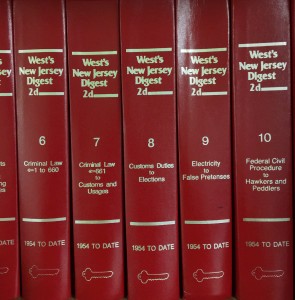Definitions
 In the New Jersey Code of Criminal Justice, these terms have the following definitions, unless a different meaning plainly applies:
In the New Jersey Code of Criminal Justice, these terms have the following definitions, unless a different meaning plainly applies:
Statute includes the Constitution and a local law or ordinance of a political subdivision of the State.
Act or action means a bodily movement whether voluntary or involuntary.
Omission means a failure to act.
Conduct means an action, omission, and its accompanying state of mind, or, where relevant, a series of acts and omissions.
Actor includes, where relevant, a person guilty of an omission.
Acted includes, where relevant, omitted to act.
Person, he, and actor include any natural person and, where relevant, a corporation or an unincorporated association.
Element of an offense means (1) conduct or (2) attendant circumstances or (3) a result of conduct such as
- The description of the forbidden conduct includes in the definition of the offense;
- Establishes the required kind of culpability;
- Negatives an excuse or justification for such conduct;
- Negatives a defense under the statute of limitations; or
- Establishes jurisdiction or venue.
Material element of an offense means an element that does not relate exclusively to the statute of limitations, jurisdiction, venue or to any other matter similarly unconnected with (1) the harm or evil, incident to conduct, sought to be prevented by the law defining the offense, or (2) the existence of a justification or excuse for such conduct.
Reasonably believes or reasonable belief designates a belief that does not make the actor reckless or criminally negligent.
Offense means a crime, a disorderly persons offense or a petty disorderly persons offense unless a particular section in this code applies to less than all three.
Amount involved, benefit, and other terms of value. Where it is necessary in this act to determine value, for purposes of fixing the degree of an offense, that value shall be the fair market value at the time and place of the operative act.
Motor vehicle shall have the meaning provided in R.S. 39:1-1. (All vehicles propelled otherwise than by muscular power, excepting vehicles as run only upon rails or tracks and motorized bicycles.)
Unlawful taking of a motor vehicle means conduct prohibited under N.J.S.A. 2C:20-10 when the means of conveyance taken, operated or controlled is a motor vehicle.
Research facility means any building, laboratory, institution, organization, school, or person engaged in research, testing, educational or experimental activities, or any commercial or academic enterprise that uses warm-blooded or cold-blooded animals for food or fiber production, agriculture, research, testing, experimentation or education. A research facility includes, without limitation, any enclosure, separately secured yard, pad, pond, vehicle, building structure or premises or separately secured portion thereof.
Communication means any form of communication made by any means, including, but not limited to, any verbal or written communication, communications conveyed by any electronic communication device, which includes without limitation, a wire, radio, electromagnetic, photoelectric or photo-optical system, telephone, including a cordless, cellular or digital telephone, computer, video recorder, fax machine, pager, or any other means of transmitting voice or data and communications made by sign or gesture.
School means a public or nonpublic elementary or secondary school within this State offering education in grades K through 12, or any combination thereof, at which a child may legally fulfill compulsory school attendance requirements.
To improve the readability of these terms while also intending to provide accurate definitions, I have reduced sentence lengths and omitted passive voice where possible.
Experienced New Jersey Criminal Defense Lawyer Michael Smolensky, Esquire, knows how to protect his clients. Mr. Smolensky can provide consultations on all criminal, juvenile, drunk driving, and municipal court cases. Call Now—(856) 812-0321.